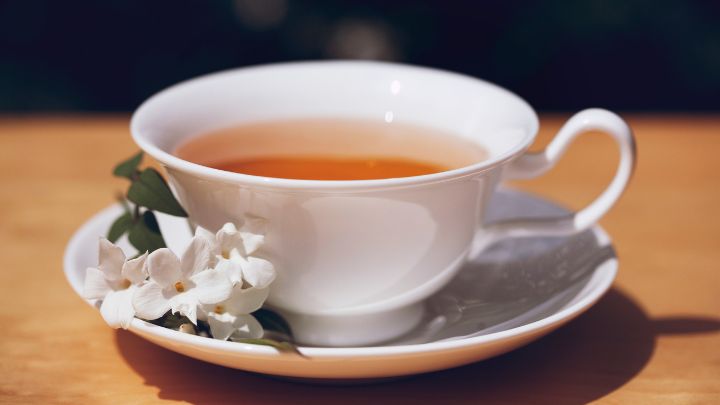Jasmine tea, where sophistication and elegance meet in a cup that’s more than just a beverage—it’s an experience. Imagine the subtle dance of delicate jasmine flowers with green, black, or oolong tea leaves, creating a complex mix of flavors.
Much like jasmine, a favorite in perfumes and scented teas, this infusion is a timeless classic enjoyed worldwide. Jasmine tea has its origin rooted in ancient Chinese traditions. More than just a delightful drink; it is also a treasure trove of health benefits.
However, some people have questions about the caffeine content of jasmine tea, and they also want to know if it can keep them awake. This and many more, you will discover as you read on.
Whether you’re a seasoned tea enthusiast or just stepping into the aromatic world of Jasmine tea, this guide is your companion to the perfect sip.
What is jasmine tea?

Jasmine tea originates from China, where green tea leaves meet the sweet scent of jasmine flowers. Skilled makers carefully mix these two, creating a tea loved for its flowery smell and unique taste.
This special tea-making process blends green tea leaves and fresh jasmine flowers with great care. The result isn’t just any tea – it’s a mix of flavors and scents that show the skill of traditional tea makers.
Jasmine tea makers say the best time to make jasmine tea is in the evening, just after sunset, when the scent of the flowers is brightest.
The flowers generously release their scent into the tea leaves to create a drink with a lovely smell and a taste that balances the earthy tea with the sweetness of jasmine.
Each sip is like a journey through ancient Chinese tea culture, where people have perfected this mix for hundreds of years.
Does jasmine tea have caffeine?
Delving into the caffeine content of Jasmine tea unveils a moderate yet present stimulant. This delightful brew, primarily crafted from green tea leaves, inherits its caffeine kick from this source.
While not as robust as some high-caffeine counterparts, Jasmine tea offers a gentle lift, making it a favorable choice for those seeking a milder energy boost.
Green tea, a key component, brings not only its earthy notes to the blend but also a touch of caffeine. This natural stimulant can provide a subtle pick-me-up without the potential jitters associated with stronger caffeinated beverages.
So, if you’re wondering whether your cherished Jasmine tea has caffeine, the answer is yes, but do not fear – it’s a balanced infusion, offering both a sensory experience and a mild energizing effect.
Sip and savor the best of both worlds in this charming cup of tradition and vitality.
How much caffeine is in jasmine tea?
The caffeine content in a cup of jasmine tea will vary with the variety and the number of tea leaves you use to brew the tea.
A cup of jasmine tea made with green tea leaves contains about 25mg of caffeine, which may be more depending on the strength of the brew.
You can generally expect a range of 20 to 60 mg of caffeine in an 8-ounce cup of jasmine tea.
Can the caffeine in jasmine tea keep you awake?
Jasmine tea, with its moderate caffeine content, can gently awaken your senses without causing restlessness. The caffeine derived from green tea leaves offers a subtle energy boost, making it a suitable choice for moments when you need a mild pick-me-up.
This delightful infusion provides a harmonious experience, enhancing alertness without the intense wakefulness of stronger caffeinated beverages.
So, if you’re looking for a balanced lift, Jasmine tea may just be the perfect cup to accompany your day.
Health benefits of drinking jasmine tea
Jasmine tea isn’t just a flavorful beverage; it also brings a range of health benefits to your cup.
Antioxidant powerhouse
The blend of green tea leaves and jasmine blossoms infuses the tea with antioxidants. Active compounds in these antioxidants help combat free radicals, supporting overall well-being.
Digestive soothing properties
Jasmine tea is known for its potential to soothe the digestive system. Enjoying a cup after meals may relieve discomfort and aid digestion.
Stress reduction
The calming aroma of jasmine in the tea contributes to stress reduction. Sipping on Jasmine tea can be a tranquil moment, promoting relaxation and mental well-being.
Elevate brain function
The slight caffeine content in jasmine green tea plays a significant role in enhancing brain function.
Caffeine prompts the release of mood-improving chemicals, such as serotonin and dopamine, making you more alert and potentially boosting short-term memory.
These health benefits make jasmine tea more than just a delicious beverage; it’s a holistic experience that can positively impact your body and mind.
Incorporating this aromatic infusion into your routine not only adds a delightful note to your day but also offers a natural way to support your overall health and wellness.
Are there any side effects of drinking jasmine tea?
While generally well-tolerated, it’s essential to be aware of potential side effects when enjoying jasmine tea.
Moderation is key
Excessive consumption may lead to mild side effects. It’s advisable to enjoy Jasmine tea in moderation to prevent any adverse reactions.
Potential for insomnia
Due to its caffeine content, consuming large amounts, especially before bedtime, may interfere with sleep. Opt for a mindful approach to avoid any sleep disturbances.
Digestive sensitivity
Some individuals may experience mild digestive discomfort. Pay attention to your body’s response and adjust your intake accordingly.
Nervousness
Caffeine in green tea may make some individuals feel nervous or jittery. It can also impact the heart, leading to a fast or irregular heartbeat.
If you notice any of these symptoms, consult your doctor. For people with a history of heart issues, it’s advisable to discuss green tea consumption with your doctor beforehand.
By understanding these considerations and embracing moderation, you can fully enjoy the benefits of Jasmine tea while minimizing the potential for any side effects.
As with any beverage, it’s always wise to listen to your body and find the balance that suits your individual preferences and well-being.
How to drink jasmine tea
Enjoying a perfect cup of Jasmine tea involves a few simple steps to extract the full flavor and aroma from this delightful blend.
Choose quality tea leaves
Begin with high-quality jasmine tea leaves. The better the quality, the richer the flavor.
Measure your tea
Use a teaspoon to measure the right amount of tea leaves. Typically, one teaspoon per 8-ounce cup is a good starting point.
Use fresh water
Boil fresh, clean water. The quality of the water affects the taste of your tea, so opt for filtered or spring water if possible.
Preheat your teapot or infuser
Pour a small amount of hot water into your teapot or infuser to warm it up. Discard the water.
Brew
Place the measured tea leaves into your teapot or infuser. Pour the hot water over the tea leaves. Use water just below boiling temperature (around 175°F or 80°C) to preserve the delicate flavors.
Steep time matters
Allow the tea to steep for 2-3 minutes. Adjust the steeping time based on your preference for a lighter or stronger brew.
Strain or remove tea leaves
Once steeped, strain the tea leaves or remove the infuser to stop further infusion. This ensures your tea doesn’t become bitter.
Serve and savor
Pour the tea into your favorite cup and savor the aroma. You can enjoy it as is or add a touch of honey or lemon for extra flavor.
Experiment with cold brewing
For a refreshing twist, try cold-brewing jasmine tea. Simply steep the tea leaves in cold water in the refrigerator for a few hours.
Mastering these steps will elevate your jasmine tea drinking experience, allowing you to relish the intricate flavors and aromas of this time-honored beverage.
Whether enjoyed hot or cold, with or without accompaniments, each cup becomes a delightful ritual of tea appreciation.
FAQs
Is jasmine tea suitable for caffeine-sensitive individuals?
Yes, it contains moderate caffeine, but the levels are lower compared to some other teas. It can be a gentler option for those sensitive to caffeine.
Can pregnant women consume jasmine tea?
While it’s generally safe, it’s advised for pregnant women to consult their healthcare provider. Moderate consumption is usually acceptable.
Can you reuse jasmine tea leaves for multiple infusions?
Yes, you can. High-quality jasmine tea leaves can be steeped multiple times, each infusion offering a unique flavor profile.
Does jasmine tea have the same health benefits as green tea?
Yes, it does. As it is primarily made from green tea leaves, jasmine tea inherits many of the health benefits associated with green tea, such as antioxidant properties.
How does jasmine tea contribute to weight loss?
While not a direct weight loss solution, the potential digestive soothing effects and the mild caffeine content may contribute to a healthier lifestyle when combined with proper diet and exercise.
Conclusion
Jasmine tea, commonly brewed with green or black tea leaves, stands out as a remarkably healthful beverage. Rich in antioxidants, it boasts numerous health benefits.
This delightful and nourishing tea contains caffeine, providing a natural boost for alertness and focus. It’s crucial, however, to consume it in moderation to steer clear of potential adverse effects.
Moreover, integrating jasmine tea into your diet is both easy and enjoyable. Its delicious taste adds a pleasant touch to your routine. If you seek a refreshing and health-promoting drink, trying jasmine tea is a worthwhile endeavor.
You might also want to learn about the caffeine content in bubble tea, another delicious tea that is fast making waves.
Thanks for reading.
